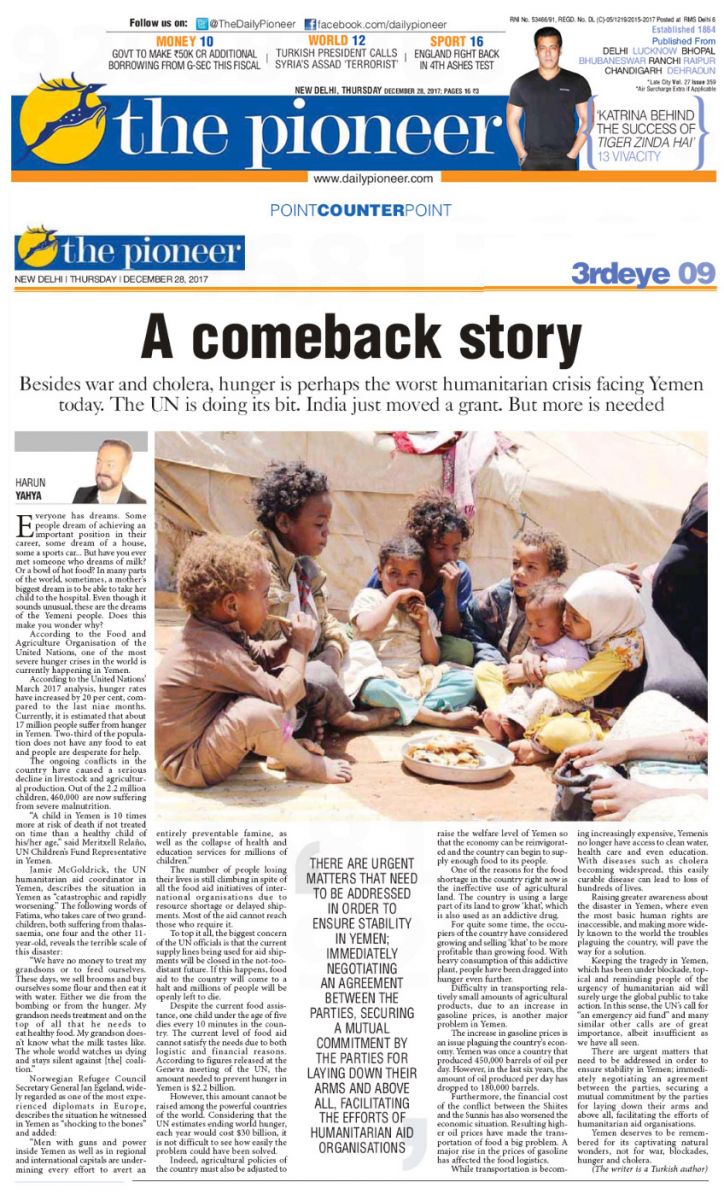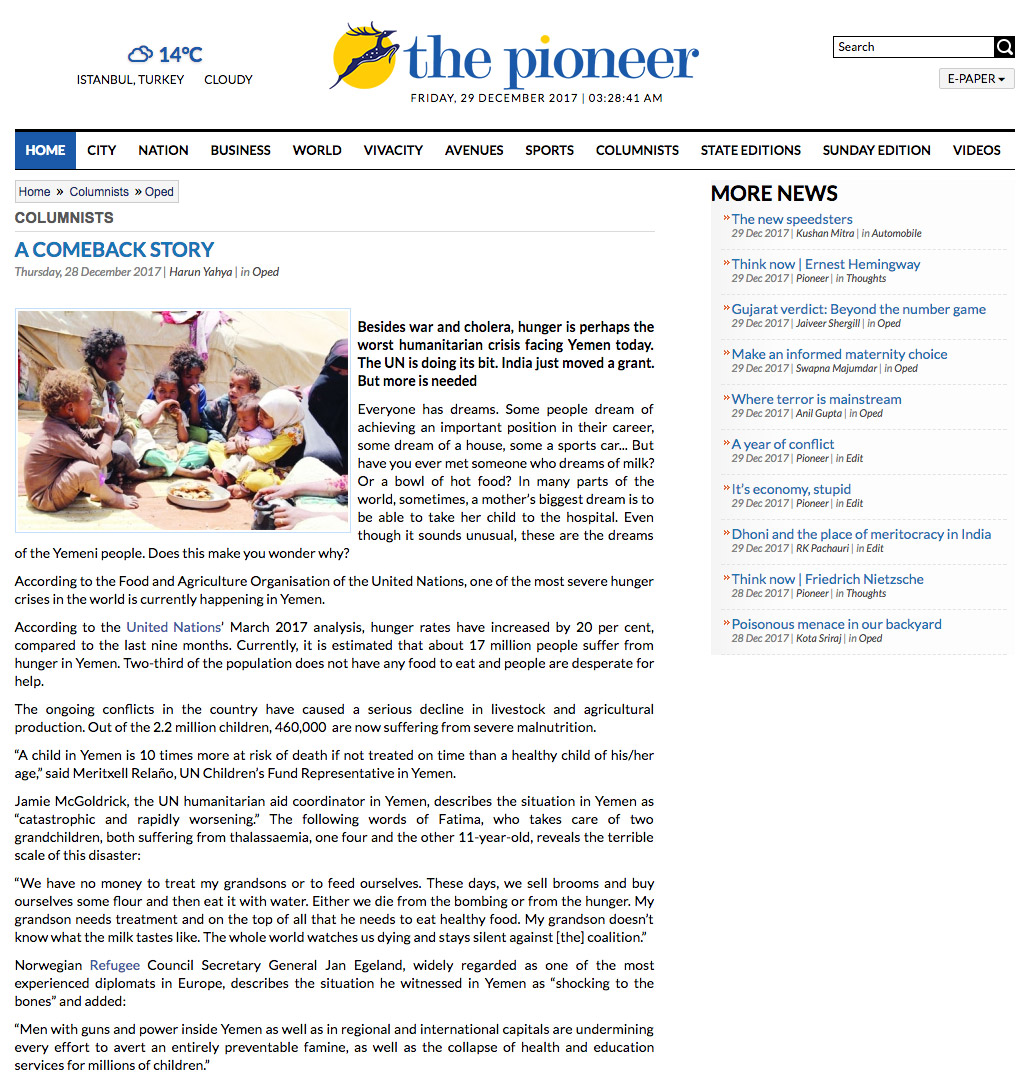Bigotry: The Dark Danger
A Comeback story

Besides war and cholera, hunger is perhaps the worst humanitarian crisis facing Yemen today. The UN is doing its bit. India just moved a grant. But more is needed
Everyone has dreams. Some people dream of achieving an important position in their career, some dream of a house, some a sports car... But have you ever met someone who dreams of milk? Or a bowl of hot food? In many parts of the world, sometimes, a mother’s biggest dream is to be able to take her child to the hospital. Even though it sounds unusual, these are the dreams of the Yemeni people. Does this make you wonder why?
According to the Food and Agriculture Organisation of the United Nations, one of the most severe hunger crises in the world is currently happening in Yemen.
According to the United Nations’ March 2017 analysis, hunger rates have increased by 20 per cent, compared to the last nine months. Currently, it is estimated that about 17 million people suffer from hunger in Yemen. Two-third of the population does not have any food to eat and people are desperate for help.
The ongoing conflicts in the country have caused a serious decline in livestock and agricultural production. Out of the 2.2 million children, 460,000 are now suffering from severe malnutrition.
“A child in Yemen is 10 times more at risk of death if not treated on time than a healthy child of his/her age,” said Meritxell Relaño, UN Children’s Fund Representative in Yemen.
Jamie McGoldrick, the UN humanitarian aid coordinator in Yemen, describes the situation in Yemen as “catastrophic and rapidly worsening.” The following words of Fatima, who takes care of two grandchildren, both suffering from thalassaemia, one four and the other 11-year-old, reveals the terrible scale of this disaster:
“We have no money to treat my grandsons or to feed ourselves. These days, we sell brooms and buy ourselves some flour and then eat it with water. Either we die from the bombing or from the hunger. My grandson needs treatment and on the top of all that he needs to eat healthy food. My grandson doesn’t know what the milk tastes like. The whole world watches us dying and stays silent against [the] coalition.”
Norwegian Refugee Council Secretary General Jan Egeland, widely regarded as one of the most experienced diplomats in Europe, describes the situation he witnessed in Yemen as “shocking to the bones” and added:
“Men with guns and power inside Yemen as well as in regional and international capitals are undermining every effort to avert an entirely preventable famine, as well as the collapse of health and education services for millions of children.”
The number of people losing their lives is still climbing in spite of all the food aid initiatives of international organisations due to resource shortage or delayed shipments. Most of the aid cannot reach those who require it.
To top it all, the biggest concern of the UN officials is that the current supply lines being used for aid shipments will be closed in the not-too-distant future. If this happens, food aid to the country will come to a halt and millions of people will be openly left to die.
Despite the current food assistance, one child under the age of five dies every 10 minutes in the country. The current level of food aid cannot satisfy the needs due to both logistic and financial reasons. According to figures released at the Geneva meeting of the UN, the amount needed to prevent hunger in Yemen is $2.2 billion.
However, this amount cannot be raised among the powerful countries of the world. Considering that the UN estimates ending world hunger, each year would cost $30 billion, it is not difficult to see how easily the problem could have been solved.
Indeed, agricultural policies of the country must also be adjusted to raise the welfare level of Yemen so that the economy can be reinvigorated and the country can begin to supply enough food to its people.
One of the reasons for the food shortage in the country right now is the ineffective use of agricultural land. The country is using a large part of its land to grow ‘khat’, which is also used as an addictive drug.
For quite some time, the occupiers of the country have considered growing and selling ‘khat’ to be more profitable than growing food. With heavy consumption of this addictive plant, people have been dragged into hunger even further.
Difficulty in transporting relatively small amounts of agricultural products, due to an increase in gasoline prices, is another major problem in Yemen.
The increase in gasoline prices is an issue plaguing the country's economy. Yemen was once a country that produced 450,000 barrels of oil per day. However, in the last six years, the amount of oil produced per day has dropped to 180,000 barrels.
Furthermore, the financial cost of the conflict between the Shiites and the Sunnis has also worsened the economic situation. Resulting higher oil prices have made the transportation of food a big problem. A major rise in the prices of gasoline has affected the food logistics.
While transportation is becoming increasingly expensive, Yemenis no longer have access to clean water, health care and even education. With diseases such as cholera becoming widespread, this easily curable disease can lead to loss of hundreds of lives.
Raising greater awareness about the disaster in Yemen, where even the most basic human rights are inaccessible, and making more widely known to the world the troubles plaguing the country, will pave the way for a solution.
Keeping the tragedy in Yemen, which has been under blockade, topical and reminding people of the urgency of humanitarian aid will surely urge the global public to take action. In this sense, the UN’s call for “an emergency aid fund” and many similar other calls are of great importance, albeit insufficient as we have all seen.
There are urgent matters that need to be addressed in order to ensure stability in Yemen; immediately negotiating an agreement between the parties, securing a mutual commitment by the parties for laying down their arms and above all, facilitating the efforts of humanitarian aid organisations.
Yemen deserves to be remembered for its captivating natural wonders, not for war, blockades, hunger and cholera.
Adnan Oktar's piece in The Pioneer (India):
http://www.dailypioneer.com/columnists/oped/a-comeback-story.html








